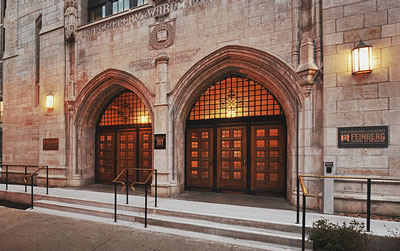Tag: Neurology and Neuroscience
-

Unlocking the Secrets to ‘SuperAging’
Northwestern investigators want to know why some people are immune to age-related cognitive decline. Their answers could inform future therapies for neurodegenerative diseases like Alzheimer’s.
-

Transcription Factor Responsible for Variability in Congenital Brain Disorder
Northwestern Medicine scientists have identified one of the molecular mechanisms behind the variability of holoprosencephaly, a congenital brain malformation.
-

Astrocytes May Play a Role in Parkinson’s Disease
New Northwestern Medicine research shows how astrocytes, a type of cell in the brain, may play a role in regulating a pathway that is overactive in Parkinson’s disease.
-

Les Turner ALS Symposium Gathers Scientists, Patients and Experts to Celebrate Research, Patient Care and Education
Physicians, patients, scientists and supporters gathered at the 6th Annual Les Turner Symposium on ALS and NeuroRepair to share research updates, provide patient education and foster new scientific collaborations.
-

Sweet Spot for Pain Relief Identified
New research from Northwestern Medicine and the Rehabilitation Institute of Chicago scientists has identified the brain region responsible for the placebo response to pain.
-

Understanding Signaling Pathways in Brain Tumors
Northwestern Medicine scientists have identified a signaling pathway that regulates the behavior of two subtypes of glioblastomas.
-

Scientists Find New Path in Brain to Ease Depression
A new pathway in the brain can be manipulated to alleviate depression, offering a promising new target for developing a drug that could be effective in individuals for whom other antidepressants have failed.
-

Krainc Receives Javits Award for Parkinson’s Research
Dimitri Krainc, MD, PhD, Aaron Montgomery Ward Professor and chair of Neurology, has received the Javits Award from the National Institute of Neurological Disorders and Stroke.
-

Zoghbi Delivers Keynote Nemmers Prize Lecture
Huda Zoghbi, MD, recipient of the inaugural Mechthild Esser Nemmers Prize in Medical Science at Northwestern University, gave a presentation on her research journey studying the neurological disorder Rett syndrome.
-

Northwestern’s Cognitive Neurology and Alzheimer’s Disease Center Receives $8.6 Million Renewal
The National Institute on Aging has renewed funding for the Cognitive Neurology and Alzheimer’s Disease Center, supporting an additional five years of research, and marking 25 years of continuous grant support.






